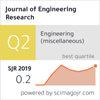Optimal energy management strategies for hybrid electric vehicles: A recent survey of machine learning approaches
IF 0.9
4区 工程技术
Q3 ENGINEERING, MULTIDISCIPLINARY
引用次数: 0
Abstract
Hybrid Electric Vehicles (HEVs) have emerged as a viable option for reducing pollution and attaining fuel savings in addition to reducing emissions. The effectiveness of HEVs heavily relies on the energy management strategies (EMSs) employed, as it directly impacts vehicle fuel consumption. Developing suitable EMSs for HEVs poses a challenge, as the goal is to maximize fuel economy yet optimize vehicle performance. EMSs algorithms are critical in determining power distribution between the engine and motor in HEVs. Traditionally, EMSs for HEVs have been developed based on optimal control theory. However, in recent years, a rising number of people have been interested in utilizing machine-learning techniques to enhance EMSs performance. This article presents a current analysis of various EMSs proposed in the literature. It highlights the shift towards integrating machine learning and artificial intelligence (AI) breakthroughs in EMSs development. The study examines numerous case studies, and research works employing machine learning techniques across different categories to develop energy management strategies for HEVs. By leveraging advancements in machine learning and AI, researchers have explored innovative approaches to optimize HEVs’ performance and fuel economy. Key conclusions from our investigation show that machine learning has made a substantial contribution to solving the complex problems associated with HEV energy management. We emphasize how machine learning algorithms may be adjusted to dynamic operating environments, how well they can identify intricate patterns in hybrid electric vehicle systems, and how well they can manage non-linear behaviors.
混合动力电动汽车的最佳能源管理策略:机器学习方法最新调查
混合动力电动汽车(HEV)已成为减少污染、节省燃料以及减少排放的可行选择。混合动力汽车的有效性在很大程度上取决于所采用的能源管理战略(EMS),因为它直接影响车辆的燃料消耗。为混合动力汽车开发合适的 EMS 是一项挑战,因为目标是最大限度地提高燃油经济性,同时优化车辆性能。EMS 算法对于确定混合动力汽车发动机和电动机之间的功率分配至关重要。传统上,用于 HEV 的 EMS 是基于最优控制理论开发的。但近年来,越来越多的人开始关注利用机器学习技术来提高 EMS 的性能。本文对文献中提出的各种 EMS 进行了分析。它强调了在 EMS 开发中整合机器学习和人工智能(AI)突破的转变。本研究考察了大量案例研究,以及在不同类别中采用机器学习技术为混合动力汽车开发能源管理策略的研究成果。通过利用机器学习和人工智能的进步,研究人员探索出了优化混合动力汽车性能和燃油经济性的创新方法。我们调查得出的主要结论表明,机器学习为解决与混合动力汽车能源管理相关的复杂问题做出了巨大贡献。我们强调机器学习算法如何适应动态运行环境,如何很好地识别混合动力汽车系统中错综复杂的模式,以及如何很好地管理非线性行为。
本文章由计算机程序翻译,如有差异,请以英文原文为准。
求助全文
约1分钟内获得全文
求助全文
来源期刊

Journal of Engineering Research
ENGINEERING, MULTIDISCIPLINARY-
CiteScore
1.60
自引率
10.00%
发文量
181
审稿时长
20 weeks
期刊介绍:
Journal of Engineering Research (JER) is a international, peer reviewed journal which publishes full length original research papers, reviews, case studies related to all areas of Engineering such as: Civil, Mechanical, Industrial, Electrical, Computer, Chemical, Petroleum, Aerospace, Architectural, Biomedical, Coastal, Environmental, Marine & Ocean, Metallurgical & Materials, software, Surveying, Systems and Manufacturing Engineering. In particular, JER focuses on innovative approaches and methods that contribute to solving the environmental and manufacturing problems, which exist primarily in the Arabian Gulf region and the Middle East countries. Kuwait University used to publish the Journal "Kuwait Journal of Science and Engineering" (ISSN: 1024-8684), which included Science and Engineering articles since 1974. In 2011 the decision was taken to split KJSE into two independent Journals - "Journal of Engineering Research "(JER) and "Kuwait Journal of Science" (KJS).
 求助内容:
求助内容: 应助结果提醒方式:
应助结果提醒方式:


